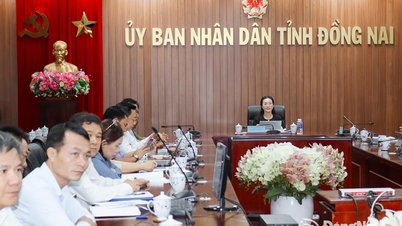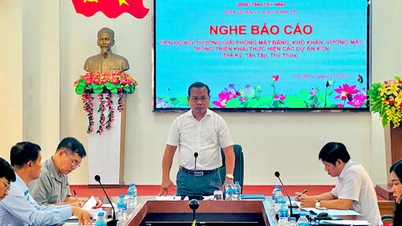
According to Mr. Nguyen Tien Thoa, Chairman of the Vietnam Valuation Association (VVA), after studying the contents of the proposed amendments and supplements to a number of articles of the 2024 Land Law, VVA proposed to consider keeping the contents of Articles 158, 159, 160, 162 in Section 2 on Land Prices of the current Land Law; only reviewing to amend and supplement the specific instructions of the Government guiding the contents of the above Articles and Clauses of the Law to better meet the requirements of practice after one year of implementing the Law.
Accordingly, VVA assessed that the price contents of the current Land Law have basically met the requirements including being compatible with the theory of land prices, the guidance of the International Valuation Standards Committee - of which the Vietnam Price Industry is a member. It has proven to be suitable with the practical conditions of the current land market in Vietnam. It has complied with the direction of the Politburo in Resolutions: 18-NQ/TW and 69-NQ/TW.
Ensuring the State's right to decide on land prices in the primary market
Regarding some major contents in the process of amending the 2024 Land Law, according to VVA, it is necessary to consider and develop regulations in the direction of ensuring the State's right to decide on land prices in the primary market (not the State deciding on land prices for all transactions in society, including the primary market and the secondary market as some viewpoints), which is to ensure the State's authority to decide on land prices, not that it is the "Principle of land valuation". If this issue is expressed in the Law, it is necessary to follow that viewpoint.
The State has the authority to directly determine land prices and has the right to regulate land prices in the secondary market and the market as a whole by appropriate measures such as: regulating supply and demand, finance and currency, etc.
This is the authority of the State that has been guaranteed since our country's economy operated under a centralized planning mechanism, then shifted to a market economy mechanism until now, not just recently abandoning the State's pricing role and only now posing it.
Explaining the above proposal, VVA said that, up to now, our Party and State have consistently affirmed: Land is a national territory created by the efforts and blood of our entire nation through many generations, so it belongs to the entire people, represented by the State as the owner and managed in a unified manner. Land has the property of use value, always has the ability to generate profits, and land use rights are special commodities bought and sold on the real estate market, so it has a price. Because the State is the owner's representative, the State has the right to decide on this type of resource with a group of powers to enjoy the rights of the owner; including the right to: determine land prices, decide to regulate benefits from land through collecting land use fees, land rents, income taxes from land use rights, regulate the added value from land that is not due to investment of land users assigned land use rights, etc.
Thus, according to VVA, the legalization of the State's right to determine land prices has been affirmed up to now and has not changed in practice, so this time it should not be raised and should not be confused, emphasizing that it is the principle of land price determination. It is the guarantee of that right in the Law and in practice that has helped the State have a basis to implement financial policies on land between the State and organizations and individuals using land and other policies related to management, market regulation, and other rights and obligations of land users.
“VVA believes that in order to exercise the right to determine land prices, whether in the form of price list, price adjustment coefficient, or specific land price, the State has, is, and continues to use independent, professional consulting organizations to advise on price options for itself so that it has more basis to decide on its own prices, which does not in any way reduce or eliminate the role of the State's right to determine prices as prescribed by law,” said Mr. Nguyen Tien Thoa, Chairman of VVA.
Consistent with the principle that the State prices land according to market mechanisms
Regarding regulations on land prices, VVA believes that the 6th National Congress of the Party has set out a comprehensive renovation policy. From here, our country's economy is determined to form a multi-sector commodity economy, operating under a market mechanism with State management and then moving towards determining the complete direction of an economy operating under a socialist-oriented market economy mechanism.
Therefore, when determining land use rights as commodities bought and sold in this mechanism, of course, objectively, it must operate according to the market economic mechanism and in that general economic mechanism: price is considered the central category of the market, must be formed and operated according to objective signals of economic laws of price (focusing on the law of supply and demand, currency circulation, competition...) and therefore price, regardless of the subject with the authority to decide the price - including the State - must also comply with this principle. That is the objective requirement of the market price mechanism.
Therefore, VVA believes that the State - as the owner's representative - has the right to decide on prices under the condition that this type of goods has operated according to the market mechanism, then the State's respect for the objective movement of the market and decision on prices according to market principles is not inconsistent with the economic nature of the State in that economic mechanism. If we are concerned about the consequences of land prices according to the market price mechanism (of course, the market is not regulated effectively) but return to the non-market pricing mechanism to stabilize the market according to subjective wishes, avoiding the rule that will turn prices into subsidized prices existing in parallel with actual prices on the market, pushing the market into a state of underground, non-transparent operations; the mechanism of asking for, giving, privileges, and benefits have fertile lands to exist...
Land valuation according to regulated market principles
According to VVA, pricing according to market principles must be a regulated market and the responsibility to regulate to have the desired market belongs to other solutions...
Accordingly, VVA believes that land prices have the function of reflecting the synthesis of major economic and social relations of the economy, it is considered a "mirror" of the land market, whichever market, the price honestly reflects that market. Therefore, land valuation cannot be based on market signals that are manipulated or affected by individual factors, unreasonable sudden factors such as speculation, price inflation, natural disasters, war, economic - financial crisis and unreasonable barriers of the market... but must be a regulated market that eliminates the above factors through the tasks of regulatory tools and measures: Supply - demand, finance - currency...
“It should be emphasized that, when the market still has the above factors, in order to price according to market principles, the Vietnam Valuation Association recommends that the State should allow reviewing and supplementing current regulations so that valuation organizations have specific criteria to select inputs for valuation methods that are common, not unique, and eliminate the above-mentioned market instability factors,” emphasized Mr. Nguyen Tien Thoa, Chairman of VVA.
Maintain market prices, regulate land finance policies
According to VVA, when implementing the market price principle, it is necessary to be consistent so that the price reflects the market price under the impact of Supply and Demand, and not to "add" social policies to the price. But there must be a synchronous policy system to control the impacts of market prices.
Accordingly, market land prices will certainly have a strong impact on the ability to access land for many subjects in all social strata, especially the implementation of social security policies. These are real impacts if there are no policies to limit these impacts.
“The Law and its guidelines need to allow for additional financial policies (taxes, revenues, etc.) in the direction that if prices are high, the revenue rate must be reduced, and more reasonable incentive policies to avoid causing “shocks” that have adverse impacts on people's lives,” Mr. Nguyen Tien Thoa, Chairman of VVA, emphasized the recommendation.
Maintain regulations on specific land valuation
According to VVA, the Land Price List is essentially a summary of land prices for each type of land associated with each land use purpose, by location, by region, by locality... The Land Price List is essentially a method of mass pricing, pricing a general price for an entire route, for the location of an entire area... The coefficient to adjust a specific price is also a general coefficient of mass nature. Because of that mass nature, it cannot cover specific cases according to the market price principle and will certainly affect the financial policy between the State and organizations and individuals using land...
Therefore, according to VVA, there still needs to be a mechanism to decide on a number of specific cases to serve appropriate policies such as: Land types in the unused group, put into use for the first time; land types with special characteristics (land reclaimed from the sea) not included in the land price list; Land use projects with the same land use purpose but different scale, function, land use structure, land use coefficient...; objective and reasonable fluctuations that cause local fluctuations in market prices; Land types, specific land use projects at the time when the State allocates land, reclaims land to implement policies on land use fee collection, land rent, site clearance compensation...
Source: https://hanoimoi.vn/chu-tich-vva-can-nhat-quan-nguyen-tac-nha-nuoc-dinh-gia-dat-theo-co-che-thi-truong-713228.html




![[Photo] Keep your warehouse safe in all situations](https://vphoto.vietnam.vn/thumb/1200x675/vietnam/resource/IMAGE/2025/10/1/3eb4eceafe68497989865e7faa4e4d0e)
![[Photo] President of the Cuban National Assembly visits President Ho Chi Minh's Mausoleum](https://vphoto.vietnam.vn/thumb/1200x675/vietnam/resource/IMAGE/2025/10/1/39f1142310fc4dae9e3de4fcc9ac2ed0)
![[Photo] Hanoi morning of October 1: Prolonged flooding, people wade to work](https://vphoto.vietnam.vn/thumb/1200x675/vietnam/resource/IMAGE/2025/10/1/189be28938e3493fa26b2938efa2059e)




























































































Comment (0)